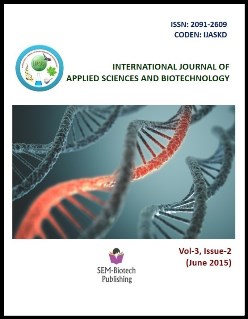Molecular Characterization of a Poly-β-Hydroxybutyrate-Producing Microbacterium Isolate
DOI:
https://doi.org/10.3126/ijasbt.v3i2.12277Keywords:
Polyhydroxybutyrate, Microbacterium, 16S rRNA.Abstract
Bacterial poly-β-hydroxybutyrate (PHB) is a natural, biodegradable polymer, which is accumulated in the cells as an energy reserve materialdue to depletion of nitrogen or phosphorous in the presence of excess carbon source. This polymer is foreseen to possess high industrialpotentiality and excellent alternative to the non-degradable petroleum-based plastics. In this study, we isolated and characterized a localbacterial strain WA81 which accumulated 18mg/L PHB after 72 h growth in mineral salt medium under nitrogen deficiency. The PHB granuleswere detected in the cells using TEM and the genes encode for this polymer were detected by oligonucleotide primers using PCR technology.The 16S rRNA gene nucleotide sequence for this isolate was used to construct a phylogentic tree against all available sequences in the GenBank.The phylogenetic tree data suggested that the closest type strain to the local bacterium is the Microbacterium paraoxydans CF36T and hencewe named it Microbacterium sp. strain WA81. Moreover, the set of enzymes responsible for the PHB biosynthetic pathway and their controllingelements were detected in this local isolate using PCR. The genes encode for the biosynthesis enzymes are phbA (β-ketothiolase), phbB(acetoacetly CoA reductase), phbC (PHB polymerase), while the genes encode for the controlling elements are phbP (phasin), phbZ (PHBdepolymerase). The novelty of this local bacterium lies in its ability to accumulate huge amounts of PHB in its cytoplasm and the presence ofa whole set of genes encode for the PHB biosynthetic and catabolic pathways of this polymer.
Int J Appl Sci Biotechnol, Vol 3(2): 143-150
DOI: http://dx.doi.org/10.3126/ijasbt.v3i2.12277




